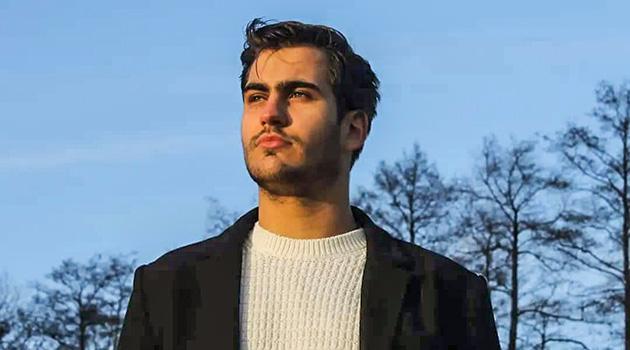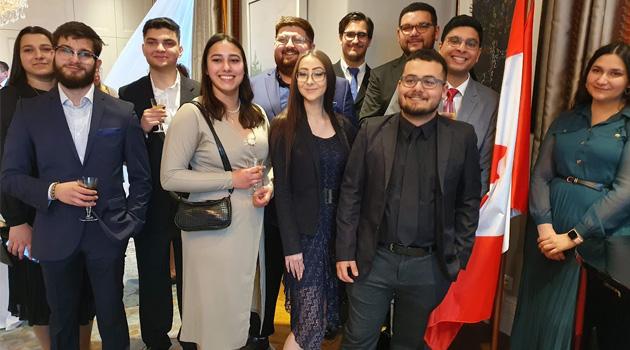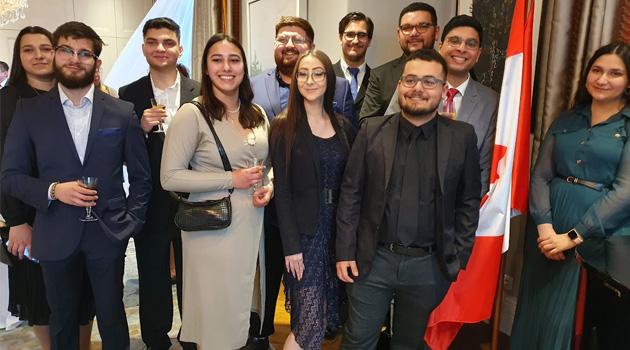Interview with Romani student at Czech university who aims to become a diplomat

Martin Kanaloš is a student at Charles University in Prague, Czech Republic. One year from now he will be taking his state examinations, and a ROMEA organization scholarship is aiding him during his studies.
He has also recently completed an internship at the Canadian Embassy in Prague, which is organized together with the Albatros Foundation. For three months he worked on public diplomacy projects there to promote the human rights of minorities, including Romani people.
Q: Martin, congratulations on successfully completing your internship! What was the selection procedure for it like?
A: Thank you. The selection procedure had two rounds. The first was in writing. My task was to draft a letter to a minister and then describe how I would organize a reception at the embassy. During the second round there was an interview with the acceptance commission. They asked me about my studies, my knowledge of Canada, and my future plans. Both rounds were in English, of course.
Q: When did you begin your internship and what kind of activities did you participate in during that time?
A: I began the internship a month after I was informed that I had been accepted, because I had to undergo a security clearance. I was in the political department, where I knew several of the staff already from the acceptance procedure. The very first day I was scheduled to meet with Madame Ambassador. I admit I was nervous, but eventually there was no reason to be. Madame Ambassador is quite a friendly, nice person and she managed to establish a pleasant atmosphere. At that moment I didn’t even suspect that I would be meeting with her on a daily basis. The political department is dedicated to different public diplomacy projects. We facilitated them for the ambassador.
Q: Can you mention any of the activities during the internship that especially captivated you?
A: I was impressed by the fact that the Canadian Government has the promotion of diversity and integration in its political program. They also do their best to disseminate the idea of including minorities into society within the framework of the embassy itself. For example, the Canadian Government supports nonprofit organizations, whether financially or through publicity. One example was the diplomatic visit we made to the Palaestra association. The Canadian Embassy financially supported them several years ago and stays in touch with them still. Palaestra is a nonprofit boxing association established by Romani community member Mr Jan Balog. He showed us how the association aids children from socially vulnerable families with finding their self-confidence through exercise, mental and physical. It was quite an enriching encounter for me and it really inspired me. I wasn’t the only one, either. Madame Ambassador was so enthusiastic that she even put on the boxing gloves and got into the ring herself. You can see how it turned out on her Twitter account. There are even photos.
Q: That sounds interesting. Martin, what new skills did you learn during the internship?
A: There is no doubt that I learned how to behave in a diplomatic setting. I observed my colleagues who are diplomats and who, even in situations where not everything is going according to plan, manage to keep a cool head and negotiate conditions in which to work. At the embassy I also expanded my knowledge of etiquette. How to converse, for example, with figures who are socially more important, how to behave respectfully toward ladies, how to dress formally. I’m also glad that I was able to use my English vocabulary at the embassy, because native speakers from Canada work there.
Q: We are glad to hear it. What do you think of internships, are they beneficial for students?
A: I believe that working internships are a brilliant way for a student to prepare for real life once school ends. During the internship the student can acquire skills and then apply them to a future job. If something doesn’t work out during the internship, or if there is something the student doesn’t know, it doesn’t matter because the student is an intern, there to learn. An employer does not have to be so charitable. That’s also why students who have done internships are at an advantage when they apply for jobs, very often employers prefer them to those who have never done an internship.
Q: You’re right. You have also attended the meetings supported by the Albatros Foundation scholarship recipients. What did you get out of that?
A: That was an unforgettable experience and mainly I made new friends. I finally got to know people whose lives are similar to mine. They are of Romani origin, they are studying at university, and they did not have the good fortune to have parents able to support their studies. During college, but mainly during my high school studies, I frequently felt like everybody else was better off than I was. They didn’t have to worry about their own financial situations or those of their parents. They didn’t have to worry about their studies because they knew their parents would take care of them. They didn’t have to worry about their ethnicity because they were part of the majority. However, in Brno, when I heard stories of students experiencing the same dilemmas in life as I have, I suddenly felt like I’m not the only one. It was an indescribable feeling. It was an enormous relief.
Q: Martin, we’re very glad to hear that. In one year you will sit for your Master’s examination, have you considered what you will do after that? Are you able to imagine your future profession because of your Canadian Embassy internship?
A: Right now I am getting my Master’s in the History of Modern European Culture at Charles University. I would like to continue in academia and lecture at university. I would also like to write fiction, which I am currently concentrating on now. I have also been considering working in the diplomatic sphere, thanks to the internship. I would like to work in the cultural department at an embassy, for example. Certainly I would head in that direction if the opportunity arose.
Q: You yourself are a Romani student from Sokolov, and the ROMEA organization scholarship aided you with being able to study at the university of your dreams in Prague. Living and studying in Prague is certainly a challenge for you sometimes. What would you say to other young people, and not just Romani ones, who are also considering getting an education and becoming independent?
A: I’d like to let everybody know that college is not just about reading textbooks until 2 AM. It is primarily about acquiring experiences and establishing contacts. You can acquire experience in any way, for example, through an internship. You can establish contact with your fellow students during different events. Contacts gradually turn into relationships – friendships, working relationships, or even partner relationships. You can establish contacts with academics and professors at conferences and seminars. At a university, instructors and students are each others’ equals. They create what is called a collegium, from which we have the English word “college” and the Czech word “kolej“, which previously did not just mean a dormitory for commuting students, but a space where any student could express opinions and concentrate on what they know and find enjoyable. My wish is that everybody could find such a space for themselves.
Q: Martin, thanks for giving us this interview, we hope you enjoy many more successes!

